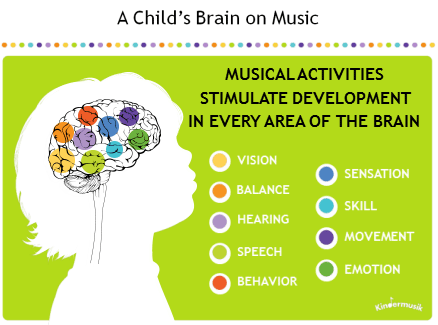 We rock out in our early childhood music classes—literally and figuratively. From our classes for babies, toddlers, big kids or families to our early literacy and language program in preschools, Head Start programs, and daycares to our ELL curriculum, we use the benefits of music to engage children of all abilities in learning. And, we have a lot of fun in the process!
We rock out in our early childhood music classes—literally and figuratively. From our classes for babies, toddlers, big kids or families to our early literacy and language program in preschools, Head Start programs, and daycares to our ELL curriculum, we use the benefits of music to engage children of all abilities in learning. And, we have a lot of fun in the process!
In the first several years of life, the cognitive development of children fires up. Connections in the brain are formed as children engage in new experiences—and repeated multi-sensory activities strengthen those connections. It’s one of the reasons research indicates that it is the critical period for teaching a child another language. Before age 8, children who learn another language are more likely to speak like a native speaker. In fact, young children who learn to speak another language, such as English as a second language, actually reshape the brain, and also strengthen their first language abilities (contrary to a previously debunked myth).
Take a peek inside the brain of bi-lingual children:
[youtube]https://www.youtube.com/watch?v=rhpVd30AJaY[/youtube]
3 reasons to use music and movement in a bilingual curriculum
Musical activities engage all of the senses and stimulate development in every area of the brain. Regardless of a child’s first language, every child speaks music and research shows it positively impacts English language learning, including these three ways:
- Music stimulates language learning, builds phonological awareness, and enhances language skills.
- Children who learn through movement show a marked improvement in memory.
- It’s fun! (Never underestimate the power of fun—and music—when it comes to engaging children!)
Try this activity for young ELL students
ELL students will love hearing the rhythmic language of “This Little Car”—over and over  again. And doing so will help them learn to speak, and later read, in English, because this video is full of opportunities for them to increase their English language phonological awareness. Phonological awareness is the ability to hear and manipulate words, syllables, and sounds in oral language. Research has shown that phonological awareness is one of the strongest predictors of later reading success—in English as well as in many other languages.
again. And doing so will help them learn to speak, and later read, in English, because this video is full of opportunities for them to increase their English language phonological awareness. Phonological awareness is the ability to hear and manipulate words, syllables, and sounds in oral language. Research has shown that phonological awareness is one of the strongest predictors of later reading success—in English as well as in many other languages.

Learn more about our bilingual curriculum…
that meets the EYFS framework in the UK, CEFR developed by the Council of Europe, and TESOL English Language Proficiency Standards for Pre-K.

